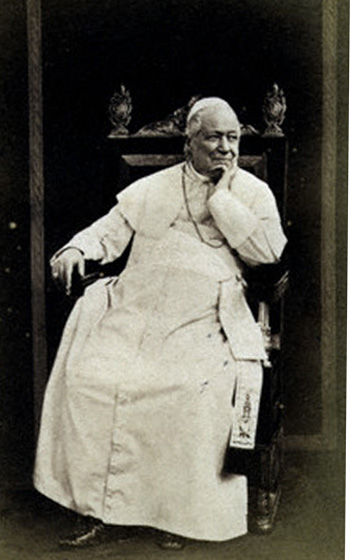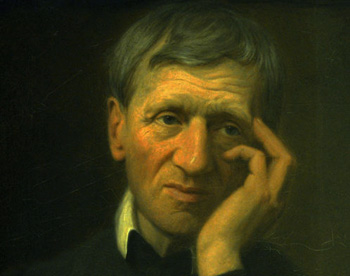 |
Traditionalist Issues
Newman and the Pope - Part I
Duplicity of Newman regarding the Papacy
James Larson
“But we must hope, for one is obliged to hope it, that the Pope will be driven from Rome, and will not continue the Council, or that there will be another Pope. It is sad he should force us to such wishes.” (John Henry Newman’s Letter to Fr. Ambrose St. John, August 22, 1870)
The above words, written approximately one month after the promulgation of the Dogma of Papal Infallibility on July 18, 1870, succinctly summarize Newman’s attitude towards the Definition, and towards the Papacy of Pius IX. This quote should astound us, and elicit an enquiry as to how such sentiments are possible from a man who has just been beatified, and who is being held up as a model of obedience to Church authority.

Newman writes that Pius IX has lived too long and is considered a god |
It needs also to be stated that the reader should not conclude that Newman’s view expressed above merely reflect a momentary indiscretion. His letters during this period are replete with such sentiments. Two months after the above letter to Fr. Ambrose, and one month after the official suspension of Vatican Council I (dashing any of his expressed hopes that the Council Fathers could reverse themselves on the Definition), he wrote the following to Lady Simeon on November 18, 1870:
“We have come to a climax of tyranny. It is not good for a Pope to live 20 years. It is anomaly and bears no good fruit; he becomes a god, has no one to contradict him, does not know facts, and does cruel things without meaning it.” (Quotations from Newman’s letters are taken from Charles Stephen Dessain’s The Letters and Diaries of John Henry Newman, v. XXVI).
The reader who wishes to somehow deny the significance of the above quotes is, of course, able to offer words from Newman’s writings which, in their general tenor and expression of belief, run directly contrary to such sentiments in regard to the Papacy. Thus, in his Discourse on University Education (1852), he writes:
“Deeply do I feel, ever will I protest, for I can appeal to the ample testimony of history to bear me out, that, in questions of right and wrong, there is nothing really strong in the whole world, nothing decisive and operative, but the voice of him, to whom have been committed the keys of the kingdom and the oversight of Christ's flock. That voice is now, as ever it has been, a real authority, infallible when it teaches, prosperous when it commands, ever taking the lead wisely and distinctly in its own province, adding certainty to what is probable and persuasion to what is certain. Before he speaks, the most saintly may mistake; and after it has spoken, the most gifted must obey.” (Dessain, vol. XXVI, p. 167)
This duplicity of Newman in regard to the Papacy is, of course, paralleled by a corresponding duplicity in regard to the Dogmatic Definition of Papal Infallibility itself. It is that proclamation of the Dogma which is the act of cruelty of which Newman speaks, and it is for having promulgated this Dogma that Newman “hopes” for the death of the Pope Pius IX or that he be driven from Rome. On the other hand, Newman claims to have personally believed in Papal Infallibility before the Vatican Council, and he also submitted to and embraced (after an agonizing struggle) the actual Definition after the Council.

Impossible to reconcile his blatant contradictions... |
This enigma of Newman’s duplicity in regard to both Dogma and the Papacy is usually lightly passed over as part of the complexity and depth of the man and the profundity of his intellect. It is my belief that such is not the case.
Rather, what might seem enigmatically complex, is simple contradiction; and what has been considered profound, is really the shallow fruit of his rejection of Thomistic philosophy, and especially of that branch of philosophy called epistemology – the science of how we know and, therefore, also the science that establishes the reliability and power of our knowledge. This subject has been covered in depth in my article titled Does God Love Us?, and I refer the reader to it for an in-depth understanding of what is really wrong with Newman’s approach towards Catholic Faith, Dogma, and Papal Authority.
In the next article, I intend to analyze the fruits of this duplicity. We have already explored Newman’s astounding words concerning the Definition of Papal Infallibility and his sentiments towards the Pope responsible for its promulgation. In the next article, I will turn to study his equally disturbing treatment of Pius IX’s Syllabus of Errors.
Continued

Posted February 11, 2012
James Larson first published this article
on his webpage War against Being

Related Topics of Interest
 The Liberal Cardinal Newman Americans Don’t Know The Liberal Cardinal Newman Americans Don’t Know
 Newman Sabotages Papal Infallibility Newman Sabotages Papal Infallibility
 Newman against Papal Infallibility Newman against Papal Infallibility
 Newman Flip-flops on Papal Infallibility Newman Flip-flops on Papal Infallibility
 Newman: Papal Infallibility Was Inaccurate Newman: Papal Infallibility Was Inaccurate
 Doubts about the Beatification of Cardinal Newman Doubts about the Beatification of Cardinal Newman
 Fr. Feeney on Cardinal Newman Fr. Feeney on Cardinal Newman

Related Works of Interest
|
|
Traditionalism | Hot Topics | Home | Books | CDs | Search | Contact Us | Donate

© 2002- Tradition in Action, Inc. All Rights
Reserved
|
 |
|